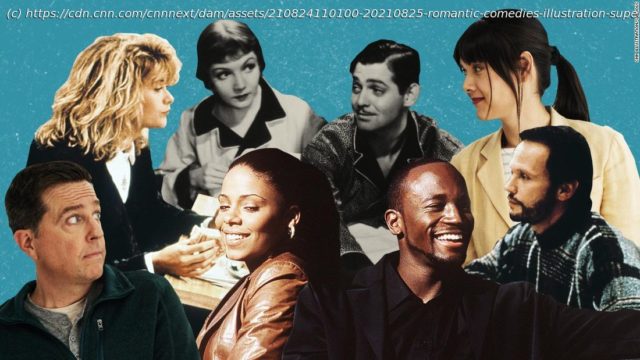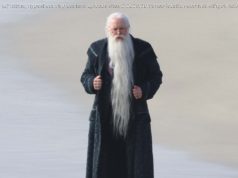Every few years, someone declares the romantic comedy dead. While the era of studio hits like « When Harry Met Sally » may be over, the genre has shifted into other forms.
In the episode, titled « Rainbow, » the happy-go-lucky titular character extolls the virtues of the romantic comedy while giving his team, the players of AFC Richmond, a pep talk: « If all those attractive people with their amazing apartments and interesting jobs, usually in some creative field, can go through some light-hearted struggles and still end up happy? Then so can we. » He refers to his philosophy as « rom-communism, » noting that believing in it « is all about believing that everything is going to work out in the end. » Without spoiling it too much, the episode culminates in a series of rom-com homages referencing everything from « When Harry Met Sally » to « Jerry Maguire. » The audience is expected to know — and love — every single pop culture Easter Egg. It’s just a new example of how the romantic comedy has evolved, even though someone declares the genre dead every few years. The rom-com has been pronounced dead since the 1970s, before the rise of stars now synonymous with the genre like Meg Ryan or Julia Roberts. In 2016, the Washington Post declared it dead again — in 2019, Variety did so as well. Now, in an era of streaming and superhero movies, the romantic comedy has been largely cast aside by traditional Hollywood studios putting out theatrical releases. Nevertheless, the genre of meet-cutes and airport scenes, sweeping kisses and witty one-liners, has persisted in various forms. What exactly is a rom-com? The romantic comedy is a movie grappling with couple formation, said Maria San Filippo, an associate professor at Emerson College and editor of the collection « After ‘Happily Ever After’: Romantic Comedy in the Post-Romantic Age. » Tonally, these movies tend to be a bit more carefree and optimistic than other movies that might deal with similar topics (such as » Marriage Story, » which San Filippo called a drama). Romantic comedies have long been a staple of Hollywood, and though they’ve become a misogynistic punchline in recent years, that wasn’t always the case. In 1934, « It Happened One Night » — credited often as the first screwball comedy, a subgenre of rom-com films — swept all five of the Academy Awards it was nominated for: best director, actor, actress, adaptation and outstanding production (now known as best picture). It was the first film to sweep all the « Big Five » awards, a feat that has only been repeated twice. Clark Gable and Claudette Colbert’s unlikely tumble into love led to the production of dozens of similar screwball comedies, launching one of the most memorable eras of romantic comedies. Katharine Hepburn, Cary Grant and Rosalind Russell were at the peak of their powers — there was shouting, rowdy one-upmanship, and of course, love! Though elements of these movies live on, classic screwball comedies fizzled out by the mid-1940s. Decades later, Woody Allen’s landmark 1977 film « Annie Hall » explored similar themes of romance and couple formation even though (spoiler alert) its main characters do not end the movie rushing into each other’s arms — a departure from earlier norms. Though the movie is undoubtedly a romantic comedy, it’s one that subverts the usual tropes in favor of something a little messier, maybe a little more real — Allen’s complicated legacy aside, it marks a notable shift in tone for the genre. For those keeping score, the film took home four Academy Awards, including best picture. After that, « neo-traditional » romantic comedies took hold, led by the hilarious bickering of Meg Ryan and Billy Crystal in 1989’s « When Harry Met Sally » (nominated for best original screenplay at the Oscars). These neo-traditional romantic comedies are now what most people think of when referencing the genre. It’s « Pretty Woman » and « Four Weddings and Funeral. » It’s Nancy Meyers and Nora Ephron; it’s Katherine Heigl and Matthew McConnaughey. These movies — to varying degrees of success — typically follow a formula: White heterosexual boy meets White heterosexual girl, problems and hilarity ensue. In Black romantic comedies, like « Brown Sugar » or « Two Can Play That Game, » the formula is more or less the same. It’s easy to dismiss the formula, said John Alberti, a professor of English at Northern Kentucky University who has written extensively about the genre. But when it’s done well, it feels like Heath Ledger belting « Can’t Take My Eyes Off You » while dancing across the bleachers — joyous magic. « Romantic comedies are dealing with the fundamental aspects of human existence: Desire, love, loneliness, » Alberti said.






